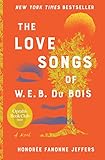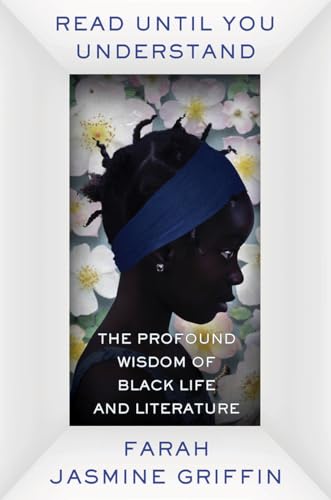I’ve noticed that some of my readers have taken to posting “trigger warnings” about my novel, The Love Songs of W.E.B. Du Bois, which deals with early African and Indigenous history in the American south. Sometimes, there are strings of at least 100 words, letting folks know all the horrible things that happen to the enslaved folks in my book. That doesn’t hurt my feelings—actually, I find it quite informative—but it does make me realize that, when it comes to the stories of African and Indigenous people(s) in this country, many folks don’t understand that American history is a trigger warning. We can either accept that fact, or we can remain soothed and oblivious—but then, we will continue to be bewildered when history repeats itself.
 I’ve learned to just write what I believe needs writing from the late Toni Morrison, who famously said that before beginning a new book, she’d ask herself a question she wanted to answer. It is noteworthy that in Read Until You Understand: The Profound Wisdom of Black Life and Literature, Morrison’s friend, the (much younger) scholar Farah Jasmine Griffin, also begins with a guiding question: “What might an engagement with literature written by Black Americans teach us about the United States and its quest for democracy?” Part scholarly monograph, part memoir—and so beautifully written—Griffin’s book alludes to intersections between American history and literature: that anti-literacy laws in the 18th- and 19th-century American South made it a crime for Black folks to read. A crime for holding a book in Black hands. A crime for White folks to teach us. Thus, when Griffin recounts the story of her father’s insistence that she comprehend the words laid out on a page—his advice forms her book’s title—we readers who are familiar with southern history understand that Mr. Griffin lovingly taught his daughter resistance, to help her survive this country, as her ancestors had survived. That thought moves and fills me with gratitude.
I’ve learned to just write what I believe needs writing from the late Toni Morrison, who famously said that before beginning a new book, she’d ask herself a question she wanted to answer. It is noteworthy that in Read Until You Understand: The Profound Wisdom of Black Life and Literature, Morrison’s friend, the (much younger) scholar Farah Jasmine Griffin, also begins with a guiding question: “What might an engagement with literature written by Black Americans teach us about the United States and its quest for democracy?” Part scholarly monograph, part memoir—and so beautifully written—Griffin’s book alludes to intersections between American history and literature: that anti-literacy laws in the 18th- and 19th-century American South made it a crime for Black folks to read. A crime for holding a book in Black hands. A crime for White folks to teach us. Thus, when Griffin recounts the story of her father’s insistence that she comprehend the words laid out on a page—his advice forms her book’s title—we readers who are familiar with southern history understand that Mr. Griffin lovingly taught his daughter resistance, to help her survive this country, as her ancestors had survived. That thought moves and fills me with gratitude.
 Frequently, I considered resistance, while reading The Prophets by Robert L. Jones, Jr. In this groundbreaking novel, Jones embraces slave history, and rejects its erasure, for his exquisitely rendered novel imagines what we know must have existed: romantic love between two enslaved Black men. I want and need to call these characters’ names, Samuel and Isaiah, because other men unknown to us had names they, too, mingled in love. (And I use “enslaved” and “Black” because, Black people weren’t the only enslaved folks in antebellum North American. Indigenous people(s) also were enslaved.) There is triple resistance in The Prophets: First, Isaiah and Samuel are determined to love each other while enduring slavery, a commerce-driven institution that was focused on breaking the binds of affection of peoples of African descent. Second, these characters are two queer Black men loving each other—erotically, romantically, spiritually—during a time of horrible homophobia, when free, White men could be imprisoned for engaging in same-gender intimacy. And third, the fact that Jones wrote and normalized a story that never has been published before—about queer love in a time of slavery—is an act of monumental resistance but also devotion. Also, the tending of ancestral altars. Also, so much that my pen and tongue cannot conjure, but which my heart and spirit knows and cherishes.
Frequently, I considered resistance, while reading The Prophets by Robert L. Jones, Jr. In this groundbreaking novel, Jones embraces slave history, and rejects its erasure, for his exquisitely rendered novel imagines what we know must have existed: romantic love between two enslaved Black men. I want and need to call these characters’ names, Samuel and Isaiah, because other men unknown to us had names they, too, mingled in love. (And I use “enslaved” and “Black” because, Black people weren’t the only enslaved folks in antebellum North American. Indigenous people(s) also were enslaved.) There is triple resistance in The Prophets: First, Isaiah and Samuel are determined to love each other while enduring slavery, a commerce-driven institution that was focused on breaking the binds of affection of peoples of African descent. Second, these characters are two queer Black men loving each other—erotically, romantically, spiritually—during a time of horrible homophobia, when free, White men could be imprisoned for engaging in same-gender intimacy. And third, the fact that Jones wrote and normalized a story that never has been published before—about queer love in a time of slavery—is an act of monumental resistance but also devotion. Also, the tending of ancestral altars. Also, so much that my pen and tongue cannot conjure, but which my heart and spirit knows and cherishes.
 And finally, Jennifer L. Morgan is one of my favorite scholars whose work on slavery history is so essential. While writing my novel (which was completed earlier this year), I’d read—and reread, and reread again—Morgan’s monograph, Laboring Women: Reproduction and Gender in New World Slavery (2011), as well as her groundbreaking essay, “Partus Sequitur Ventrem: Law, Race, and Reproduction in Colonial Slavery” (2018). Both Morgan’s book and essay allowed me to depict fully imagined—and hopefully, realistic—lives of enslaved Black women. For example, it was Morgan who introduced me to the 1662 Virginia law (quoted in the title of her essay) that ensured that the children of African American women remained enslaved and removed Black fathers’ legal and lineal power over their children. This law represents an act of familial violence, one that echoes in the negative (and false) narrative of “fatherless Black children” often repeated today. Further, Morgan tells us that, during the 17th and 18th centuries, Black women were publicly disrespected and demonized, their Black bodies described as monstrous by White male slaveholders, their Black women’s morality publicly diminished, especially when compared to the femininity of White women.
And finally, Jennifer L. Morgan is one of my favorite scholars whose work on slavery history is so essential. While writing my novel (which was completed earlier this year), I’d read—and reread, and reread again—Morgan’s monograph, Laboring Women: Reproduction and Gender in New World Slavery (2011), as well as her groundbreaking essay, “Partus Sequitur Ventrem: Law, Race, and Reproduction in Colonial Slavery” (2018). Both Morgan’s book and essay allowed me to depict fully imagined—and hopefully, realistic—lives of enslaved Black women. For example, it was Morgan who introduced me to the 1662 Virginia law (quoted in the title of her essay) that ensured that the children of African American women remained enslaved and removed Black fathers’ legal and lineal power over their children. This law represents an act of familial violence, one that echoes in the negative (and false) narrative of “fatherless Black children” often repeated today. Further, Morgan tells us that, during the 17th and 18th centuries, Black women were publicly disrespected and demonized, their Black bodies described as monstrous by White male slaveholders, their Black women’s morality publicly diminished, especially when compared to the femininity of White women.
 When I Googled Morgan (as I do regularly), and saw that she had a new book coming out this year, Reckoning with Slavery: Gender, Kinship, and Capitalism in the Early Black Atlantic, I was elated. I bought this book in both physical and Kindle versions on the day it was released. Like Morgan’s earlier work, Reckoning with Slavery goes deep into the archives, to construct utterly human narratives about the Black women whom Whites named as property, and who were only considered worthy within the realm of commerce. Simultaneously, Morgan shows us that the enslavement of Black folks developed alongside White supremacist philosophy and public intellectual writing, and like Morgan’s earlier work, she alerts us to those reverberations of White supremacist teachings that still exist in our time—like Griffin’s father tells us, if we’d but read and stick with this history, we’d eventually understand.
When I Googled Morgan (as I do regularly), and saw that she had a new book coming out this year, Reckoning with Slavery: Gender, Kinship, and Capitalism in the Early Black Atlantic, I was elated. I bought this book in both physical and Kindle versions on the day it was released. Like Morgan’s earlier work, Reckoning with Slavery goes deep into the archives, to construct utterly human narratives about the Black women whom Whites named as property, and who were only considered worthy within the realm of commerce. Simultaneously, Morgan shows us that the enslavement of Black folks developed alongside White supremacist philosophy and public intellectual writing, and like Morgan’s earlier work, she alerts us to those reverberations of White supremacist teachings that still exist in our time—like Griffin’s father tells us, if we’d but read and stick with this history, we’d eventually understand.
It’s not difficult for me to draw a connection from early American history to these difficult, current times of the 21st century—which is why work wrestling with American history is so important, and why I remain so fascinated by it. To me, known and unknown Black historical figures aren’t dead and gone, but alive. These figures speak, they sing, and they give me wisdom. They give me sustenance, and I’m telling you, these days I really need sustenance and wisdom.
Sometimes, when I watch the news, I think, “How much more can I take, dear Lord? How much longer before I crumble?” But then, I think on what my ancestors endured—what they still teach me—and I carry on.
More from A Year in Reading 2021 (opens in a new tab)
Don’t miss: A Year in Reading 2020, 2019, 2018, 2017, 2016, 2015, 2014, 2013, 2012, 2011, 2010, 2009, 2008, 2007, 2006, 2005









